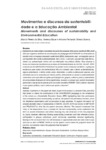Mostrar o rexistro simple do ítem
Movimentos e discursos da sustentabilidade e a educação ambiental
| dc.contributor.author | Pereira da Silva, Marcia | |
| dc.contributor.author | Bauer, Vanessa | |
| dc.contributor.author | Silveira Guerra, Antonio Fernando | |
| dc.date.accessioned | 2019-03-15T12:06:03Z | |
| dc.date.available | 2019-03-15T12:06:03Z | |
| dc.date.issued | 2015 | |
| dc.identifier.citation | Ambientalmente Sustentable, 2015, 20: 1035-1059. ISSN: 1887-2417 | es_ES |
| dc.identifier.issn | 1887-2417 | |
| dc.identifier.uri | http://hdl.handle.net/2183/22257 | |
| dc.description.abstract | [Resumo] Apresenta-se neste artigo o resultado de parte da pesquisa feita numa escola de São José (SC) que objetivou verificar as contribuições da pedagogia Montessori às dimensões da escola como um espaço educador sustentável (EES), destacando aqui concepções que os participantes têm sobre sustentabilidade, bem como, o discurso que permeia este termo, desde sua apresentação teórica até sua efetivação nas práticas diárias. Para alicerçar a busca por respostas revisitaram-se as ideias de Sustentabilidade de Sachs, Sauvé, Sato e ancora-se em Nietsche e Foucault ao pensar como o discurso se efetiva. A pesquisa evidenciou que muitos dos entrevistados têm um conceito para o termo sustentabilidade, alguns entendendo o termo sobre varias dimensões e outros evidenciando apenas uma dimensão das cinco propostas por Sachs, porém, efetivamente ao pensar a sustentabilidade conectada com suas efetivas ações: participação em grupos, coletivos jovens, assembleias de comunidade diminuem de forma significativa, levando a concluir que: ainda é necessário aproximar o que se faz do que se diz e vive como nos alerta Freire: “(2001) não é o discurso o que ajuíza a prática, mas a prática que ajuíza o discurso”. | es_ES |
| dc.description.abstract | [Abstract] It presents in this paper the result of part of the survey in a school of San Jose (SC) that aimed to check the contributions of the MONTESSOR pedagogy to the dimensions of the school as a Sustainable Education Space, (EES) highlighting here that participants have conceptions about sustainability, as well as, the speech that permeates this term, since his theoretical presentation until his execution in daily practices. To support the search for answers revisited ideas of Sustainability of SACHS, SAUVÉ, SATO and anchor in NIETSCHE and FOUCAULT to think like the speech becomes effective. The research evidenced that many of the respondents have a concept for the term sustainability, some understand the term on several dimensions and others showing only one dimension of the five proposals by Sachs, however, effectively thinking sustainability connected with their effective actions: participation in groups, collectives, youth community assemblies diminish significantly, leading to the conclusion that: it is still necessary to approximatae what one does what it says and lives as alert in FREIRE "(2001) is not the speech which makes the judgment about the practice, but practice makes the judgment that the speech.” | es_ES |
| dc.language.iso | por | es_ES |
| dc.publisher | Universidade da Coruña, Servizo de Publicacións | es_ES |
| dc.rights | Atribución-CompartirIgual 3.0 España | es_ES |
| dc.rights.uri | http://creativecommons.org/licenses/by-sa/3.0/es/ | * |
| dc.subject | Discursos | es_ES |
| dc.subject | Sustentabilidade | es_ES |
| dc.subject | Espaço educador sustentável | es_ES |
| dc.subject | Currículo | es_ES |
| dc.subject | Espaço físico | es_ES |
| dc.subject | Speeches | es_ES |
| dc.subject | Sustainability | es_ES |
| dc.subject | Sustainable education space | es_ES |
| dc.subject | Curriculum | es_ES |
| dc.subject | Physical space | es_ES |
| dc.title | Movimentos e discursos da sustentabilidade e a educação ambiental | es_ES |
| dc.title.alternative | Movements and discourses of sustainability and environmental education | es_ES |
| dc.type | info:eu-repo/semantics/article | es_ES |
| dc.rights.access | info:eu-repo/semantics/openAccess | es_ES |
| UDC.journalTitle | AmbientalMente Sustentable: Revista científica galego-lusófona de educación ambiental | es_ES |
| UDC.volume | 20 | es_ES |
| UDC.startPage | 1035 | es_ES |
| UDC.endPage | 1059 | es_ES |
| dc.identifier.doi | https://doi.org/10.17979/ams.2015.02.020.1656 |






